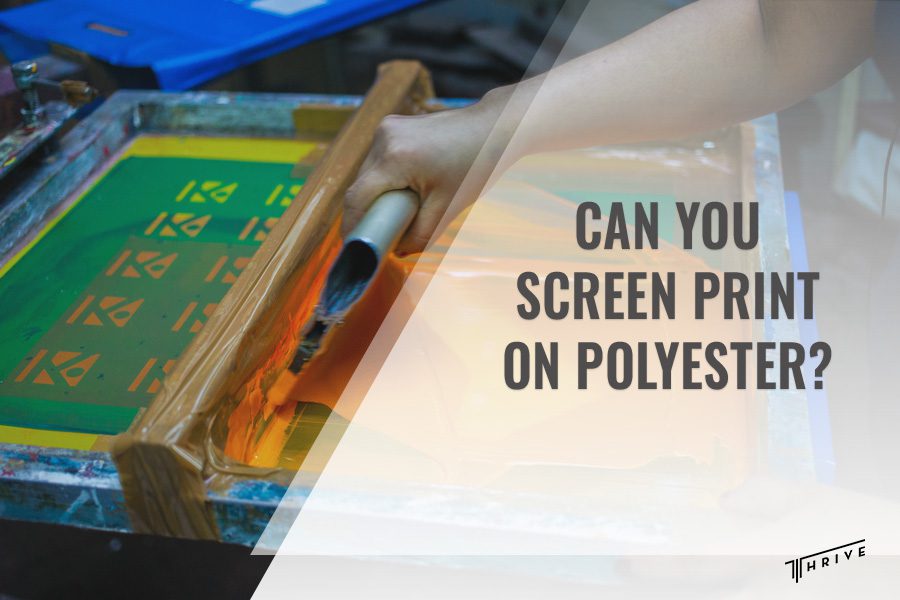Screen printing has become a popular option for many clothing retailers and apparel businesses. As one of the best contract services in the US, we at Thrive Screen Printing specialize in many different printing techniques and fabrics. This includes various textiles and dyes to ensure our clients always get the best results. So, can you screen print on polyester?
To better understand this question, we want to elaborate on the methods used to print on polyester garments and highlight the most important aspects of the process. Many of our clients come to us with various ideas that we happily turn into reality while using different methods. Thus, we also want to give insights into what goes on behind closed doors.
Before diving into any screen printing project, it’s best to inform yourself of the details to ensure it’s what you’re looking for. So, continue reading to discover if you can screen print on polyester fabric, what printing techniques are used, and how they may benefit you.
Basics of Screen Printing
Before we dive into fabric printing on polyester garments, you must understand the basic concept of the screen printing process. Since Thrive Screen Printing has been part of this since 1990, we’ve had the opportunity to watch this practice evolve and grow alongside modern technological advancements.
The basics of this process include applying dye or ink onto a surface through a pre-made blocking stencil. Since it involves using a mesh to print one ink layer at a time, different layers can be used to create a multi-colored design. At first, the main material used for this process was silk, but as materials evolved, the focus was turned to synthetic threads.
Besides its widespread use in clothing, you can also apply it to other products, such as balloons, clocks, and accessories. However, if you want to achieve the best results, you should always ensure a professional service does it with experience in creating unique stencils. So, if you’re wondering about the best contract screen printing near you, check out what our professional team at Thrive Screen Printing has to offer!
Can You Screen Print on Polyester?
This process can be applied to various materials, including wood, textile, paper, and plastic. Regarding fabric printing, the best options have always been synthetic and natural blends.
Cotton is usually the most desirable material for this process. This ideal fabric is praised for its ability to absorb color and have a vibrant finish. However, this also doesn’t mean that screen printing can’t be applied to polyester. So, the answer is yes, you can screen print on polyester.
This material’s nonporous and stretchy nature makes it more challenging to work with. Also, as they don’t have the same absorbent nature as cotton, special inks may be used to ensure the quality of the print.
The last thing you should remember is that there are different types of polyester products. While some clothing is made from 100% polyester, cotton polyester options are also available. We’ll elaborate on each type separately to ensure you understand how it affects the screen printing process.
Screen printing on 100% polyester
Can you print on 100 polyester? Some may think this is one of the most challenging materials to screen print on. However, an experienced professional printing service, such as our team at Thrive Screen Printing, will know all the little details they should watch out for to ensure a premium-quality result.
The first element we always focus on is choosing the right materials to fit the fabric. Since polyester is made of synthetic materials, it can cause dye migration when exposed to heat. For example, when exposed to temperatures above 300 °F, the darker-colored polyester can transfer its dye into the printing ink. Thus, it results in getting darker colored prints, like white turning into gray.
Another common issue with printing on 100% polyester is that it’s prone to heat. Since it derives from fossil-fuel-based polymer, high temperatures can cause scorch marks, melting, and shrinkage.
To avoid this problem, we specialize in polyester inks to ensure the final results are high-quality and vibrant. Such dyes are the low cure and plastisol inks, designed to be printed at lower temperatures to avoid dye migration. By using them, we prevent shrinkage of heat-sensitive materials and lower the overall energy consumption.
Screen printing on cotton polyester
Cotton polyester can contain different volumes of these materials. Some of the most common types of such clothing are:
- 50% cotton and 50% polyester
- 60% cotton and 40% polyester
To understand their properties better, we’ll explain them both separately.
Ink printing on 50% cotton and 50% polyester
Can you screen print on polyester t-shirts that are 50% cotton and 50% polyester? This fabric is much more forgiving than pure polyester due to its absorbent properties. The risk of dye migration is lower, and they often result in a more vibrant finish.
However, since it does contain polyester, we’re always careful not to trigger the color bleeding process. We prioritize temperature regulation to ensure each of our clients gets premium-quality results. While the ink is heated to 320 °F, the 50/50 blend fabric mustn’t surpass 360 °F. Plus, we use the thinnest ink film possible because it’s harder to control the ink’s temperature when thick.
Another method we use is high screen tension, known for producing low off-contact. This alludes to the gap between the screen and fabric, allowing us to use less ink and create a better-quality design.
Ink printing on 60% cotton and 40% polyester
The second type of cotton and polyester printing you should know of involves 60% cotton and 40% polyester. Even though it sounds similar to a 50/50 blend, this fabric type is known to be more breathable and softer. However, even though it’s thought to have finer properties, it still doesn’t entirely prevent dye migration.
The best way to prevent color bleeding is by using specialized polyester ink. As mentioned, this allows us to use low temperatures during the printing process, which results in less damage and better results. We ensure all our products leave our facility without any melting, scorching, or shrinkage.
Screen printing on polyester spandex
The last type of polyester clothing you may come across is polyester spandex. But can you print on polyester fabric that includes one of the most challenging materials to work with? While some may think it’s impossible due to the spandex’s stretching nature, a real professional can find the best solution for any type of textile.
The biggest issue that may arise during screen printing on polyester spandex is for the ink to crack when the fabric is stretched when worn. We pay special attention to creating suitable printing ink to ensure the products’ longevity and quality. For example, we tend to add a stretching additive so that the ink can withstand the material’s elasticity.
Since this garment type also includes polyester, we don’t forget the importance of using low-temperature printing methods. This way, not only will your designs last longer, but the chances of them cracking or changing color are lower.
Conclusion
Can you screen print on polyester? Even though this fabric printing technique can be applied to different materials, polyester can be a challenging option. It’s always recommended to put your trust in the hands of experienced professionals who are familiar with working on this material to get the best results.
That’s why we at Thrive Screen Printing focus on creating the best possible products for our customers. Having dealt with such fabric prepared us to invest in the most suitable materials and techniques for this process. Thus, all our polyester prints offer vibrant designs and are held to the highest standards.
So, if you’re looking for the best screen printing services around you, contact us today, and our friendly team will guide you through the process. Not only do we offer high-quality results, but our designs will surely make you stand out!

Robert Fisher is the founder and CEO of Thrive Screen Printing and brings extensive experience in the screen printing and fulfillment industry.


